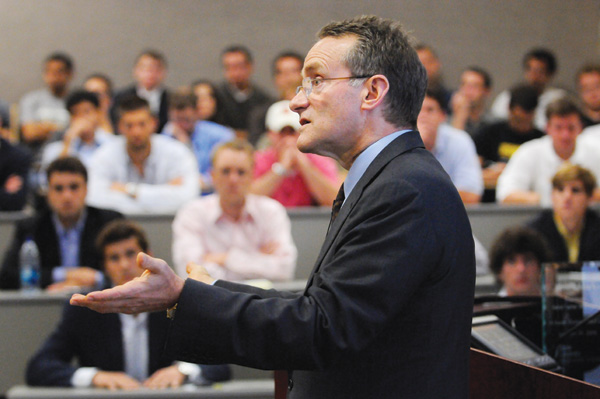
Howard Marks, chairman of Oaktree Capital Management and a highly respected observer of the economy, expects a slow recovery from the recession.
To investment manager Howard Marks, the roots of the financial crisis can be summed up in a simple observation: When people think there’s no risk, that’s the riskiest situation imaginable.
“Fear of loss, risk aversion and caution are the things that keep markets in health and in balance,” Marks said. “If people aren’t afraid of losses, they will bid assets up to prices that are too high and engage in practices that are too risky.”
Marks, chairman of Oaktree Capital Management and a highly respected observer of the economy, visited the Freeman School on Sept. 29 to deliver the 2009 R. W. Freeman Distinguished Lecture.
A veteran of the convertible and high-yield securities groups at Citicorp and TCW, Marks co-founded Oaktree Capital in Los Angeles in 1995 and built the firm into an elite alternative and non-traditional investment company with over $60 billion in assets under management, but he has gained even greater notoriety in recent years for his writings on the economy and investing.
Marks said the stage for a crisis was set by strong trends toward increased leverage and a willingness to assume virtually any risk in pursuit of high returns. In the collective psychology of the market, the fear of missing an opportunity eclipsed the fear of losing money.
“In the couple of years leading up to the crisis, we had people taking advantage of financial innovations that were very complex and opaque,” Marks said. “We had people who believed that risk had been banished through securitization and tranching and disintermediation and decoupling—all these buzz words.”
Marks said the essentials of recovery—de-levering the economy, replacing destroyed capital and restoring public faith—are well underway, but the fundamentals of the economy are still iffy. Unemployment remains high, retail sales are slow, and the nation’s industrial base is shrinking.
“People ask me how long till things are back to normal and I ask them what they mean by normal,” Marks said. “We will have recovery, I just don’t think the next 10 to 15 years will be as strong as the last 10 to 15 years prior to ’07.”
In the end, Marks said the best advice he can give clients is to hope for the best but prepare for the worst.
“No one ever went bust preparing for tough times,” Marks said. “If you prepare for tough times and they don’t materialize, the worst consequence will be that somebody else will make more money than you. In my opinion, that’s not the end of the world.”
The R. W. Freeman Distinguished Lecture series was established in 1984 and is named in honor of Richard W. Freeman (BBA ’34), former president and chairman of the Louisiana Coca-Cola Bottling Co. Ltd. and former chairman of the board of Delta Air Lines. Freeman served on the Board of Tulane University for 13 years and was a major benefactor of the university and the business school. He received the business school’s Outstanding Alumnus Award in 1959 and Tulane University’s Distinguished Alumnus of the Year Award in 1975. In the early 1980s, Freeman was instrumental in naming the business school in memory of his father, civic leader and philanthropist Alfred Bird Freeman.
